Islam teaches us a lot about taking care of the environment. By neglecting the Earth, we are denying the signs and guidance of our creator. This post discusses what the Quran says about Islam and the Environment, our duties and how to be an Eco-Friendly Muslim.
In this post we’ll look at:
- The world being our ‘Amanah’ (Trust/Guardianship)
- What the Quran says about the Earth
- Ways in which we are destroying the natural balance of the Earth
- Our responsibility as Muslims
- 4 Acts on How to be an Eco-Friendly Muslim
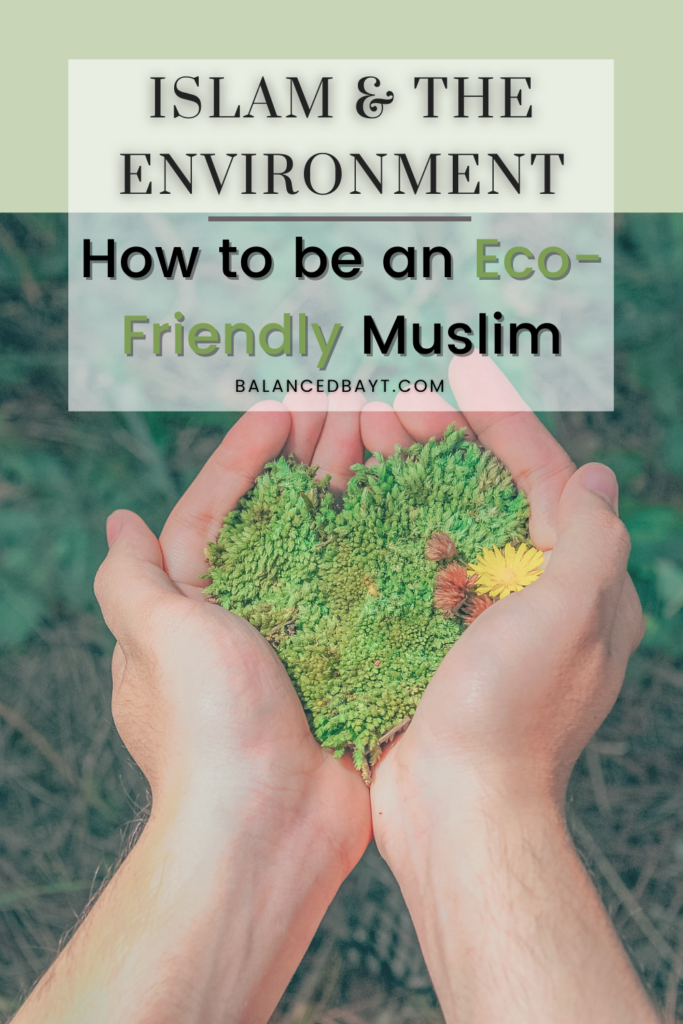
It’s time to Green up your Act – The World is our Amanah
In the Quran, God refers to us as Khalifas or stewards of the Earth. As Muslims, we should see the world as our Amanah and therefore, take care of it in order to ensure that the balance of the Earth is maintained.
We need to try whatever little we can, to restore Allah’s perfect equilibrium, protecting His Amanah and ‘greening’ up our act. We can start by thinking about minimizing in everything that we do. By this, I mean in our shopping habits, transport habits, eating habits or our resource usage habits!
And do not waste [God’s bounties] verily, He does not love the wasteful.
– QURAN 6:141
A ‘greener’ minimalistic lifestyle basically means living with little or making do with less. The minimalism movement encourages an attitude whereby we try to live with little, so we spend less time burdening our mind with consuming more.
The benefit is that when we stop weighing our mind down with consumption and materialism, we feel freedom and happiness. We have more time to think about other things and improve our productivity. We have more time to fulfil our duties in pleasing Allah and making life more fruitful and meaningful.
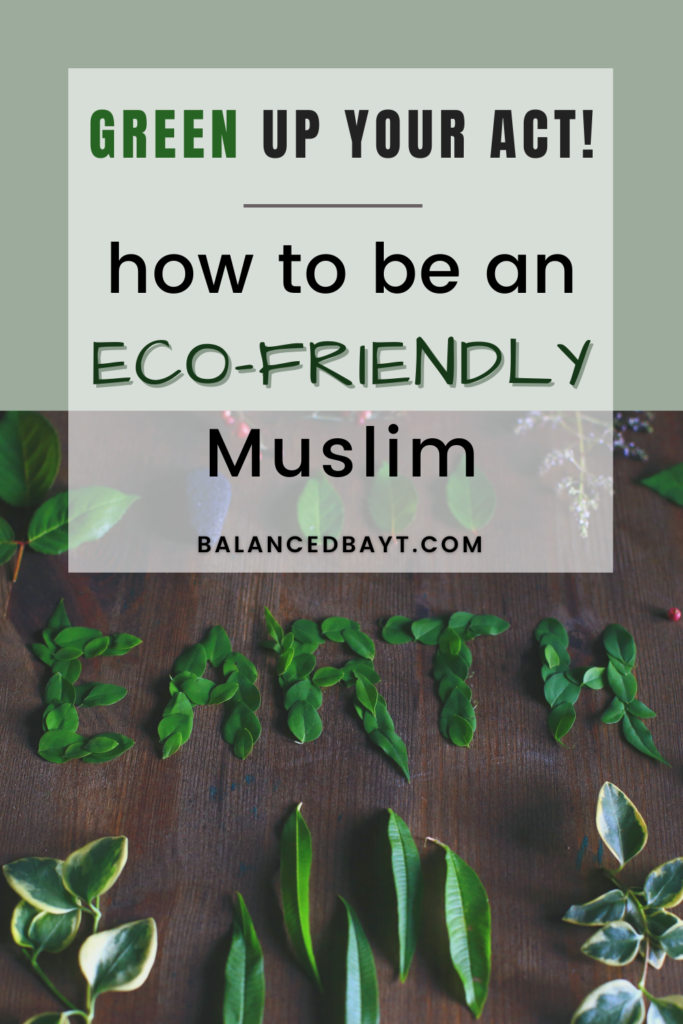
Our Islamic Connection with Nature – be an Eco-Friendly Muslim
The holy Quran, a guide for mankind, makes immense reference to a person’s relationship with nature and the world around them. We have grown from the environment we were born into, interacted with it and gained from it.
We were created from dust and all our nourishment has come directly from the Earth, through our food such as the fruits and vegetables which comes from the Earth.
“And Allah has brought you forth from the Earth.
– QURAN 71:17
As our nourishment is sourced directly from the Earth, it does not make sense to not look after the place that feeds us. We are so careful when it comes to looking after our homes and our cars. We focus on healthy eating and look after our bodies but what about the Earth, our God-gifted home that feeds us and keeps us alive?
The Balance Around Us
As part of Allah’s divinity, He created a world balanced by different environments, temperatures, habitats and terrains forming a physical landscape in perfect equilibrium, with everything that it requires to function perfectly.
Sadly, the effects felt of environmental imbalance and problems are not as pronounced in the developed world. The choices we make and the lifestyles we lead, impacts our sisters and brothers in the developing countries.
The one who is sure of getting water feels no thirst.
AlI IBN-ABI talib (as)
Destroying the Balance
Two popular environmental impacts, especially felt in developing countries, are the effects on climate and air, land and water. As we all know, extreme weather events have led to catastrophes felt in different countries. With some experiencing prolonged droughts and rivers drying up, to others experiencing their homes being destroyed by the rising sea levels through flooding.
When he turns his back, his aim everywhere is to spread mischief through the earth and destroy crops and cattle…
QURAN – 2:205
The unsustainable usage of cars and airplanes have led to a dramatic increase in air pollution, causing a change in our climate. Whilst land and water pollution are further driven by conspicuous consumerism, especially in today’s ‘Instagrammable’ era.
It’s fair to say that both these two impacts have no boundaries and therefore, everything we do must be done in an eco-responsible and eco-conscious manner.
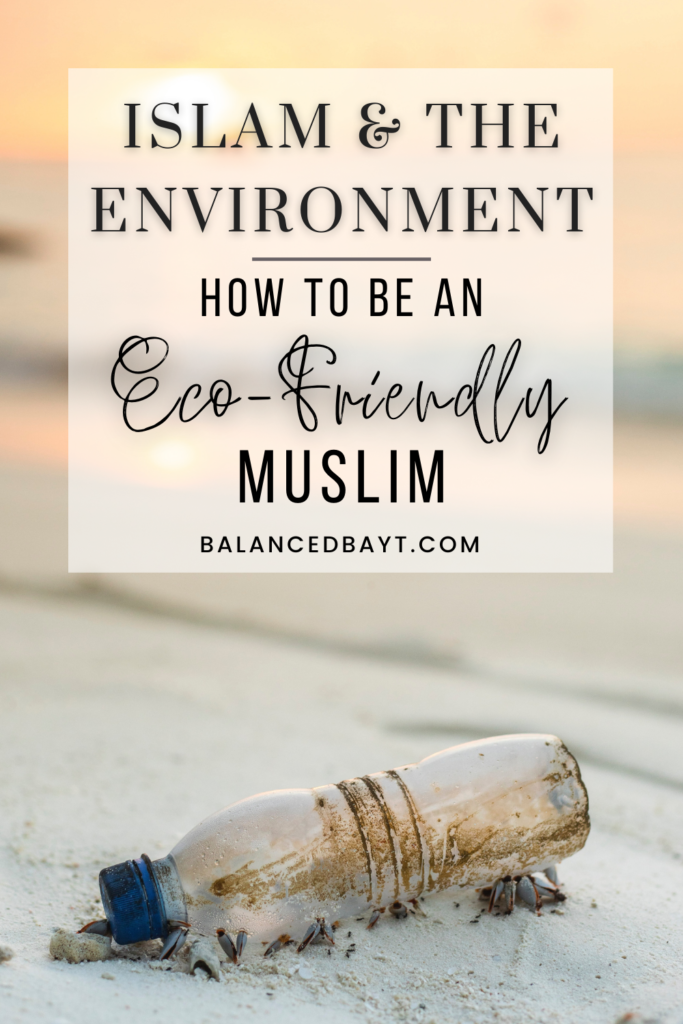
Month of Ramadan
In the month of Ramadan, as we look forward to family iftars and gatherings, we may not see the waste that occurs during this time. The fridge can get over-crowded with food and goodies brought from family members, which could eventually end up in the trash.
At our centers, the vast use of disposable plastic cups and plates, every single day for the ENTIRE month, is a massive problem. We have been living like this for years, unaware of the global environmental issues it is causing.
Recently, some centers and groups have started to hold ‘green’ Iftars, that is creating a language of Muslim-based environmentalism. We LOVE what a dedicated group of ladies did for their local Mosque – check out the article here.
This message is still not as widespread in the Muslim community as it should be and so it is incumbent upon us all, as part of our deen, to get this message across.
Some simple methods you could implement within your local community to make them ‘greener’ and eco-friendly could be:
- To have a ‘green’ team that could educate the members
- Investing in compostable and reusable plates and cutlery OR asking members to bring their own from home (like these cute Bento boxes)
- Asking members to bring their own mugs and water bottles! (as you know how much we LOVE our tea in Ramadan!)
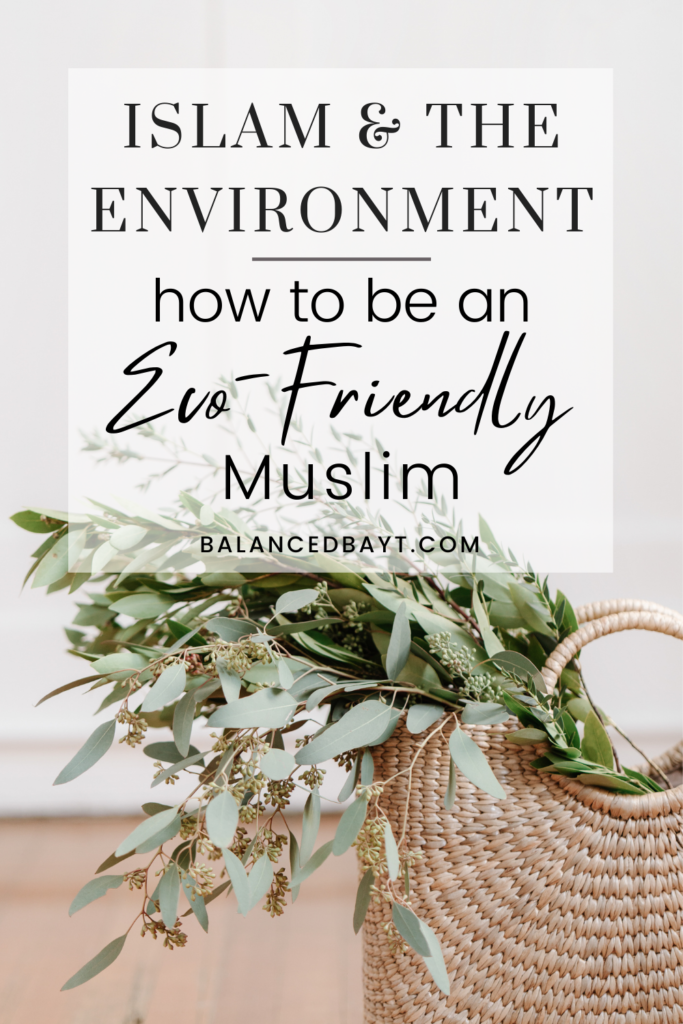
Pilgrimage
As pilgrims, we visit these blessed lands and gain so much from them. We don’t want to leave and take everything we can for our souls benefit from them. But what do we do in return? Do we treat those lands the same way we treat our homes? Do we think about the people who will be cleaning up our mess after the events are over?
Hajj
As an Ummah, we need to be more aware of our actions and surroundings. The Pilgrimage of Hajj is compulsory upon all Muslims once in their lifetime. This soul-cleansing, selfless and spiritual experience is one that truly is life-changing. But it is unfortunate to see the waste accumulated during this short season of Hajj, which almost contradicts what we are there for.
A statistic found that “Makkah city landfills receive about 2750 tons of waste every day. While during the Ramadan and Hajj seasons, these quantities become 3000 tons and 4706 tons per day respectively.” 1
Visiting Holy Sites
During Arba’een, one of the largest religious pilgrimages in the world, takes part in Karbala, Iraq. Pilgrims would walk to the holy shrines in Karbala from Najaf. During this walk, there are stations handing out food, shelter and water. At the same time, it is disappointing to see the amount of garbage bins overflowing with plastic water bottles and waste.

A statistic found that “It is estimated that currently ~ 5% of the event municipal solid waste is recycled by informal recyclers: there is no formal recycling scheme.”2
This is extremely concerning to see that from an event which sees around 25 million pilgrims, only a small percentage of all the solid waste accumulated is recycled! This means that the majority ends up as toxic waste.
What can we do?
One initiative which advocates for greener holy sites is Green Pilgrim. They are a global community which are “committed to making a positive environmental impact on the holy lands of Najaf, Karbala and beyond.”
To find out more and how you can get involved, check out their website and Facebook group.
Our Responsibility – Be an Eco-Friendly Muslim
As part of the divine balance, God created humans to benefit from these environments but bestowed intellectual comprehension for us to act as His ‘Khalifas’ stewards on the Earth. When things become imbalanced – admittedly, it is at our cost and because of us!
Then We appointed you viceroys in the earth after them, that We might see how ye behave
QURAN – 10:14
Being God’s trustees on the Earth, the world is our eco-responsibility. We must become Eco-Friendly Muslims. The deeper we investigate the creation of the world, the more we realize that all it’s entities have interrelated effects or reciprocal outcomes.
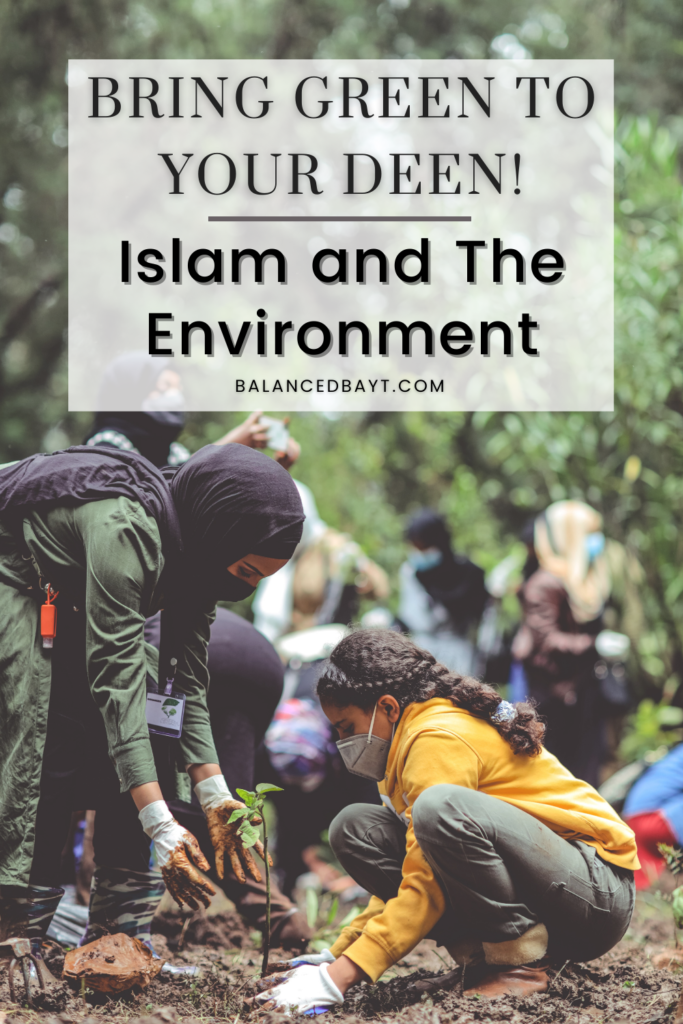
4 Acts to get you started to become an Eco-Friendly Muslim in 4 weeks
Act 1 for Week 1: Change up your buying attitude
We have an endless consumption attitude and almost look for any excuse to buy more stuff. If your hairdryer is broken, don’t just throw it away! Most likely, it can be repaired and last for another year.
A common one is clothing. Just because you’ve spotted a new trend or that dress on sale has taken your fancy, doesn’t mean you add it to your cart! Make use of the clothes you have got be conscious that buying more clothing adds to your carbon footprint and this is Israaf (extravagant) of which goes against the balance set by Allah (swt) and the balance we need to aspire towards for our homes.
Act 2 for Week 2: Clean up your grocery run habits
Take fabric bags to put your fruits and veggies in, rather than the plastic bags at the store. For one, it will reduce your impact on climate change; reduce your waste ending up at a landfill site or on a random shoreline.
Act 3 for Week 3: Reduce your meat consumption
Try and limit yourself to having meat once or twice a week. Why?
A huge amount of grain must be produced to feed cattle and thousands of liters of water is needed to produce the meat. Tons of trees must be cleared for cattle grazing. These are just some effects of demands for meat.
Try and see how you can change your eating habits this week. Or experiment with vegetarian options instead!
Act 4 for Week 4: Travel Green
In some way, the pandemic has been a blessing by restoring some of the world’s natural equilibrium as the number of flights have decreased. More people are working from home which means less use of transportation.
This is a pointer to how important it is to stop over-indulging in air travel for wanderlust. For this week, contemplate on how much you use your car and ways you could limit that. Think about how much this act could reduce the amount of air pollution you contribute to.
For, He it is who has made you inherit the earth, and has raised some of you by degrees above others…
qURAN – 6:165
As inheritors of the Earth, as Khalifas, it is our Islamic duty to make changes to our behaviors in order to reflect the teachings of the Quran. Taking care of the Environment is part of Islam.
Hopefully, this post and the tips helped in guiding you towards becoming an Eco-Friendly Muslim.

References:
- https://www.researchgate.net/publication/277332302_Waste_Biorefinery_in_Makkah_A_Solution_to_Convert_Waste_produced_during_Hajj_and_Umrah_Seasons_into_Wealth
- Investigating municipal solid waste management system performance during the Arba’een event in the city of Kerbala, Iraq https://link.springer.com/article/10.1007/s10668-018-0256-2
